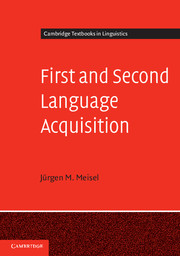Book contents
- Frontmatter
- Contents
- List of figures
- List of tables
- Preface
- List of abbreviations
- 1 The quest for the LAD
- 2 First language development: Universal Grammar as the centrepiece of the human language making capacity
- 3 Obvious (observable) similarities and differences between first and second language acquisition: Developmental sequences
- 4 The initial state and beyond
- 5 Developing grammatical knowledge: Parameter setting and inductive learning
- 6 Neural maturation and age: Opening and closing windows of opportunities
- 7 A (tentative) theory of language acquisition – L1, 2L1 and L2
- Glossary
- Notes
- References
- Index
- References
6 - Neural maturation and age: Opening and closing windows of opportunities
Published online by Cambridge University Press: 05 June 2012
- Frontmatter
- Contents
- List of figures
- List of tables
- Preface
- List of abbreviations
- 1 The quest for the LAD
- 2 First language development: Universal Grammar as the centrepiece of the human language making capacity
- 3 Obvious (observable) similarities and differences between first and second language acquisition: Developmental sequences
- 4 The initial state and beyond
- 5 Developing grammatical knowledge: Parameter setting and inductive learning
- 6 Neural maturation and age: Opening and closing windows of opportunities
- 7 A (tentative) theory of language acquisition – L1, 2L1 and L2
- Glossary
- Notes
- References
- Index
- References
Summary
Sensitive phases for language acquisition
(Language) differs … widely from all ordinary arts, for man has an instinctive tendency to speak … while no child has an instinctive tendency to brew, bake, or write … (Language) is an instinctive tendency to acquire an art.
Charles Darwin (1874). The descent of man, and selection in relation to sex.Scrutinizing parallels and differences between first and second language acquisition has led us to the conclusion that some of the observable differences between these two acquisition types reflect different kinds of knowledge about formal properties of the respective target systems and result from different learning processes. These fundamental differences between L1 and L2 acquisition, I have argued, are due to the fact that the LAD does not operate in quite the same way in the two types of acquisition. It goes without saying that a complex and multifaceted process like language acquisition cannot be explained in terms of one factor or even one bundle of factors alone. In fact, variability within and across learners has been argued to be a defining characteristic of L2 acquisition, and this can be variability of knowledge as well as of how the knowledge is used (cf. Meisel, Clahsen and Pienemann 1981). Although the working of the LAD cannot be held accountable for all observed L1–L2 differences, there are good reasons to believe that it is the single most important cause for both similarities and differences.
- Type
- Chapter
- Information
- First and Second Language AcquisitionParallels and Differences, pp. 202 - 239Publisher: Cambridge University PressPrint publication year: 2011
References
- 1
- Cited by



